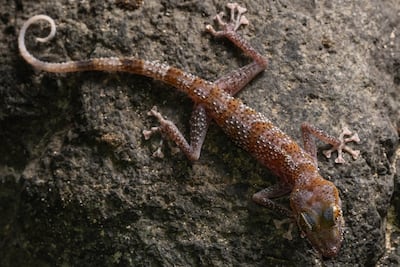Calls have been made to establish breeding programmes to arrest a decline in numbers of an under-threat species of gecko unique to the UAE.
The Emirati leaf-toed gecko has become severely inbred as its distribution has become more restricted, newly published research has found.
The reptile, the only vertebrate species unique to the country, lives in Sharjah and Fujairah in only known five sites, some of which have undergone developments that have caused its population to fall.
Scientists say that transferring genetic diversity between the existing groups, or captive-breeding programmes, could safeguard the creature.
Known scientifically as Asaccus caudivolvulus, the reptile is classified by the International Union for Conservation of Nature as critically endangered – just one category up from being extinct in the wild.
Dr Bernat Burriel-Carranza, the first author of a study on the species published this month in Molecular Ecology, said that the distribution was now "extremely reduced".
Changing landscape puts gecko at risk

"It’s in an area that’s been heavily developed and therefore there are lots of pressures on this species," said Dr Burriel-Carranza, who is from the Institute of Evolutionary Biology at Pompeu Fabra University in Barcelona and the Museum of Natural Sciences of Barcelona.
"The populations that are in developed areas, they are very inbred. If there is less diversity, it means they have less opportunity to adapt to future threats.
"Although there might be lots of specimens in these areas, it’s important to note that the diversity is going down."
The researchers sequenced the genome – all of an organism’s genetic material – of about a dozen A. caudivolvulus individuals, mostly using tail-tip samples.
For comparison, they extracted DNA from additional gecko types, the majority of them other Arabian Asaccus species.
A. caudivolvulus had "consistently lower genetic diversity" than other Arabian Asaccus species, something that the researchers indicated was the result of ancient population declines.
Dramatic drop in diversity
However, genetic analysis indicated that among populations in heavily developed areas, there had also recently been "high levels" of inbreeding.
When a specimen from 2013 was compared with one from the same location from 2022, genetic diversity was found to have "dropped dramatically".
The Emirati leaf-toed gecko is a slightly transparent reptile that measures about 11cm in length and has long and thin legs and leaf-like pads on its toes.
A nocturnal creature, during the day it hides in humid cracks and crevices among rocks, where it is safe from predators.
The latest genetic work follows an initiative in 2022 to find wild populations of the species, with researchers having been unsure whether it still existed in the wild.

It had previously been known only in two locations, but in 2022 a total of 52 individuals were found in five areas.
One location was an inaccessible undeveloped area south of Khor Fakkan, while "relatively high numbers" were detected north of Khor Fakkan in a promontory being developed.
There were a "few specimens" on Shark Island, a small island off the east coast, while the species was also found in a heavily developed area in north Sharm in Fujairah where, in 2016, it had also been found. Here the gecko’s habitat has been "extremely reduced to a small patch of rocks".
Inland, the species was identified at Wadi Wuraya National Park, although it is thought to have been introduced there, as it was found amid rocks transported from another location.
The new study is titled Clinging on the brink: Whole genomes reveal human-induced population declines and severe inbreeding in the Critically Endangered Emirati Leaf-toed Gecko.
"Overall, results show that A. caudivolvulusis in urgent need of protection, and habitat preservation must be warranted to ensure the species’ survival," the researchers wrote in the paper.
The paper’s senior author, Prof Salvador Carranza, director of the Institute of Evolutionary Biology at Pompeu Fabra University in Barcelona, said that a captive-breeding programme would be "highly recommended" to protect the species.
Averting extinction
Efforts to transfer genetic diversity between the existing sites could also help to safeguard the creature.
"It’s endemic to the UAE, which makes it even more important. If it disappears from the UAE, it disappears from the world. It disappears from everywhere. It’s extinct," Prof Carranza said.
While the overall population of the Emirati leaf-toed gecko is much reduced, Prof Carranza said that in Sharjah and Fujairah some of the populations are in protected areas. He said that the gecko could survive even in developed locations if there were rocky areas for it to live in.
Prof Carranza praised the UAE authorities for their assistance with the research, saying that it would have been "impossible" to have carried it out without their help.
Co-authors of the study came from organisations including the Breeding Centre for Endangered Arabian Wildlife, part of the Environment and Protected Areas Authority in Sharjah.
Other researchers were from the Fujairah Research Centre and the Fujairah Genetics Centre, while the Mohamed bin Zayed Species Conservation Fund helped to finance the work.
The researchers said that more surveys could be undertaken to better understand the distribution of the species. The humid coastal locations that the Emirati leaf-toed gecko inhabits can be difficult to reach.
"I’ve worked a lot in Arabia and in this case because it’s on the coast you need boats to access some of the areas. It would be great if we could investigate more," Prof Carranza said.
Other gecko species have suffered population falls in the UAE, including the wonder gecko, Teratoscincus keyserlingii, a species also found in Pakistan, Afghanistan and Iran.





